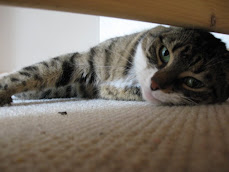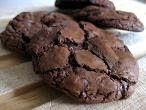
Anyway, this is all just to say that although I made my party offering in fun, it's something that makes me quite thoughtful. Since the party is a happy occasion though, I thought I would follow some of the suggestions for a children's victory party. VE and VJ day were celebrated with lots of street parties, and some of them were especially for children. Marguerite notes that some children tasted ice cream for the first time at those parties - it was rare in a time when most people didn't have a fridge. I didn't try the wartime ice cream recipe, but followed some of the suggestions for other tasty morsels - sandwiches and tarts.
I wanted to get really into the spirit of things, so I followed a bread recipe in the same book for my sandwiches. Bread wasn't rationed during the war itself, although it was afterwards, but it was scarce and expensive, as was flour. People were recommended to eke their flour out with oatmeal, so I used that to make up a quarter of the total amount of flour. Wartime flour was much coarser than modern flour, but I did use plain rather than bread flour since that wasn't on sale in the 1940s. I was expecting a bit of a brick of a loaf, but it was actually quite nice and fluffy and just tasted a little more wholemeal-like from the oatmeal.

So, bread made and sliced, I turned to the list of suggested sandwich fillings. A lot were potted meats and fish, so I chose a mixture of grated cheese and carrot, with a little bit of milk to moisten, and mock banana, which was mashed parsnip with banana essence and a little sugar (bananas weren't available at all during the war because of the shipping blockades). I didn't have banana essence so I used a bit of the liquid that frozen bananas leave behind when they defrost. It was sweet enough with that not to need extra sugar. I quite liked it, though I'm impressed with 1940s children if they were happy to have it on their sandwiches. Perhaps it just needed mashing a bit more, or maybe they all went for the potted shrimp and jam ones instead. I hope they also got sandwiches with tops - I ate mine open and the carrot and cheese filling kept falling off. I suspect this is my fault not the sandwich topping, and if you can't make a bit of mess with your tea party when war's over, when can you?

My book suggested a selection of cakes, tarts and biscuits to go with the sandwiches and I selected some tarts as I was interested to see how wartime pastry turned out. Fats and sugar were in short supply - as were eggs - only 1 per week at the most, and many of the recipes call for reconstituted dried eggs instead. My pastry didn't need eggs though I think the proportion of fat is a bit lower than usual. I filled some with jam and turned the others into Maids of Honour - another recipe in the book which I hadn't heard of before, and which consist of a little jam topped with a margarine, sugar and breadcrumb mix. They were quick and easy and were perfect child-sized finger food. The Scientist is a jam tart fan and he liked them very much and thought that the Maids of Honour had a certain treacle-tart quality to them.
Of course I need a drink to send to Stephanie's party as well, and the book was pretty clear on what to serve: lemon or orange squash. I can't really even imagine what the end of the war must have meant to people who'd lived through it but making my party entry has definitely made me think a lot about cooking with wartime restrictions. I plan to try out a few more recipes in the future, so expect to see Pete Potato and his friends featuring a few more times!

Wartime bread (from Victory cookbook)
450g plan flour (you can sub in a quarter of this with oatmeal
heaping 1/4 tsp salt
300ml water
2 tsp dried yeast
Sift flour and salt into a mixing bowl. Heat the water until just warm. Add yeast and sugar to the water, top with a sprinkling of the flour and leave until frothy (12-15 mins)
Make a well in the centre of the flour, pour in the yeast liquid and mix well. Turn out on to a floured board and knead until the dough fills in a hole made by your finger. Shape into a ball and return to the oiled bowl. Leave in a warm place to prove until doubled in size [I did this in the fridge overnight]. Turn the dough out and knock back. Form into a round loaf or place in a loaf tin and leave to prove again until it's almost doubled in size. Cover it very lightly with a cloth. This stage will take 45-60 mins at room temperature.
Meanwhile preheat the oven to 22C/425F. Bake for 35-40 mins until the base sounds hollow when tapped.
Maids of Honour (from Victory Cookbook)
Pastry: [I halved this quantity but still made 12 little tarts]
6 oz self raising flour
pinch salt
1 1/2 - 2 oz margarine
water, to mix
Sift flour and salt into a bowl. Rub in the marge, add enough water to make a firm rolling consistency. Roll out and cut into circles. Place one circle in each indentation in a fairy cake tin.
Filling [for 12-15 tarts]:
A little jam
1 oz margarine
1-2 oz sugar
1/2 tsp almond essence
3 oz fine breadcrumbs
2 tbsp milk
Top the pastry with a little jam. Cream the margarine, sugar and almond essence together, add the breadcrumbs and milk. Spoon the top over the jam and bake in the centre of a moderately hot oven 15-20 minutes until firm and golden



7 comments:
Somehow, I'm not even remotely surprised at your dishes!! It's very 'you', and I love it.
My WW cookbook is full of open-faced sandwiches, which I still have a hard time dealing with. I think we just got used to the convenience of the second slice of bread; we don't have to be so careful of the filling!
Just great, and looking forward to passing those plates around Saturday...
what a great post - the way the war affected eating habits sounds amazing
I was surprised to hear that there were no bananas - that mock banana might have gone down well in Australia a couple of years ago when a hurricane destroyed the crops and they became horrendously expensive
I also enjoyed hearing about marguerite patten whom I keep seeing when looking at old cookbooks
What an interesting post--I think we forget about what life was like then. Such unique things to bring to the party. Nice to "see" you there!
What a lovely tribute to that time! Your dishes are wonderful and the lessons even more so. The privations of wartime are hard for us to understand in our time of gourmet and plenty. Thanks for sharing and glad to see you at the party!
xo
The history is very interesting. I just finished MFK Fisher's How to Cook a Wolf which was about meal preperation in wartime. It made me think about how fortunate we have been during my lifetime here.
You went all out for the retro party and did a great job.
Thank you everyone! I'm so touched that you all liked it, and agree wholeheartedly with your comments on the period. I would definitely miss bananas if they went off the menu now, so that one was a bit of a thought-provoker.
Natasha: I'm really interested in the book you mentioned - I'll have to go and look it up.
What an interesting history lesson to go with the food! I write historical fiction and always find the most challenging part to be details like food, etiquette, dress, slang, and that sort of everyday stuff.
Post a Comment